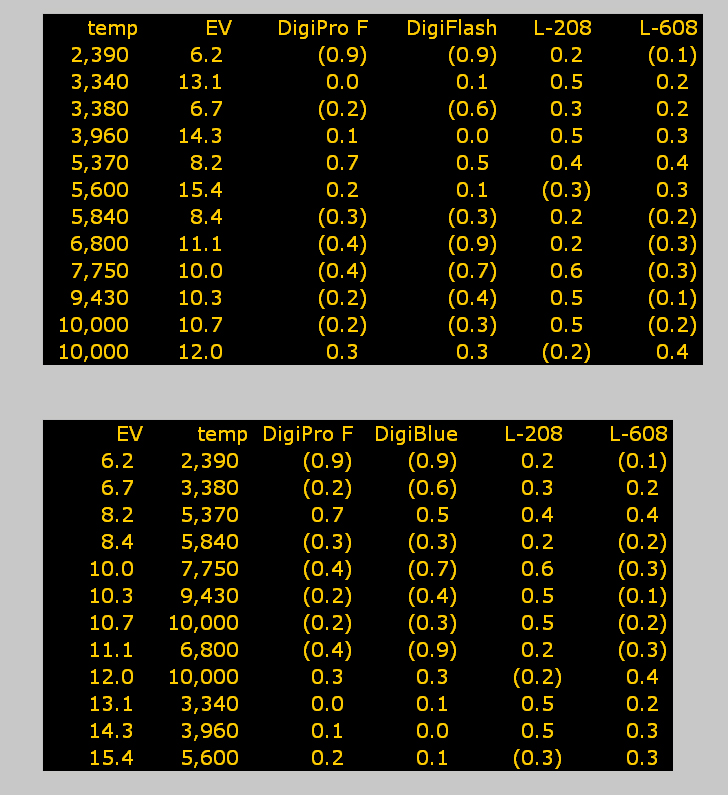I have been experimenting with light meters, again. Many years ago, we had a long thread on this subject, it was very interesting, lots of good contributions. Light meters are calibrated at one color temperature. So how far off is the readings when the color temperature changes from the Kelvin range it was calibrated at ?
For those who don't shoot chrome film, and are NOT ultra sensitive about nailing exposure, please stop reading here. :-)
Anyway, I took my Gossen 3 Color meter, which has RGB sensors... it produces a Lux value for light intensity based on 3 color sensors. In the old thread, it was suggested that an ideal light meter would read the 3 colors of light, and then produce an EV value... discussions then went into having the meter calibrated for each of the color films...OK, that was really dreamin considering film was dying then, and now.... well.....
I used the Gossen 3 Lux reading as a baseline reading. I converted Lux to EV via a table such as this on Sekonics web site....
http://www.sekonic.com/support/support_2.asp
I took incident meter readings with 4 meters and compared them with the Gossen Color 3 EV value... the 4 meters were...
Sekonic L 608
Sekonic L 208 (very small manual)
Gossen DigiPro F
Gossen DigiFlash (mini meter, new model)
the color temperatures I tested ranged from 2300 to 10k Kelvin. I had readings at almost every 1k color temp interval.
I used the Gossen 3 meter Lux / EV reading as the basis, and compared all the other readings to it. I sorted the results by color temp. and by EV. A value of 0 means the incident meter matched the Gossen 3 Lux value. A value of -.4 means the incident meter read .4 stops below the Gossen 3 Lux / EV value. +.4 = incident meter read .4 stops above the Gossen Lux EV value.
As expected, the results vary tremendously, not just against the Gossen 3 Lux/EV but also vs. each other. IMO this demonstrates something I have always felt...... these meters are at best, "fair instruments", certainly not ideal tools if you shoot under varying light and color temperatures. These test results are all from outdoor lighting, so landscape shooters beware. I consider a .4 stop error quite large from a meter, for chrome film. Add in some errors of your own, processing, etc. Its not hard for your exposure to be off .75 of a stop. Then, as you can see, there is often errors near one stop. (all based on the Lux/EV value)
I was hoping the results would yield some compensation values I could apply to a given meter, when knowing the color temp, but that is not the case, as its a mix of color temp AND EV values that trip up the readings. Of course, maybe the color temp meter provides the most accurate exposure readings. Not sure of this either..... any thoughts?
Regardless of whether the Gossen 3 color meter provides the most accurate exposure readings, the sad finding of this test was.... the meters themselves vary tremendously from each other... often a full stop variance....you can read across the lines, -4 to +6 = 1.0 stop variance.




 Reply With Quote
Reply With Quote



Bookmarks